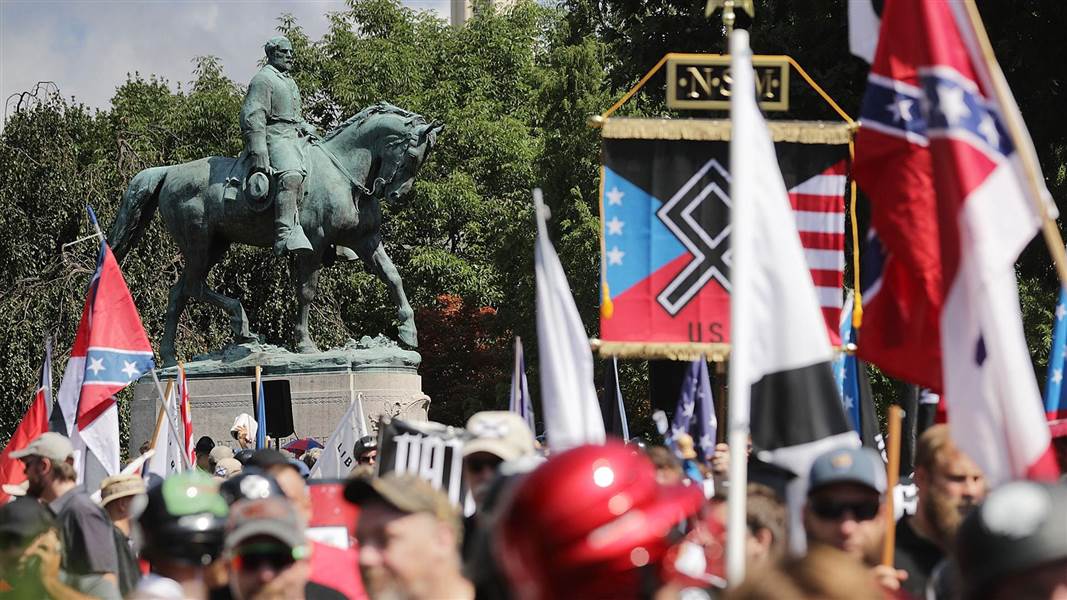
“Unite the Right” discovers a friend in the White House
Into an idyllic setting, they strutted.
Bearing Swastikas and other symbols of hate, they came to a peaceful college town set in the Virginia Piedmont: Charlottesville.
Full of irrational hatred and fear posing as pride, chanting “the Jews will not replace us” and other racist nonsense, they marched toward an old, hallowed bastion of learning, a university founded by a native son, Thomas Jefferson, a champion of the Enlightenment.
This was a profanation surely, but the real aim was provocation. We are going to get in your face everywhere, they were saying. We will invade even your little academic safe space and shout out our contempt for you from the rafters.
Itching for a fight, locked and loaded for murder and mayhem, this dark army of the night, lighting its way with torches, came bringing a message: We are Amerika. We. To your exclusion. Live with that. Or there will be blood. And there was.
The blood of Heather Heyer is on the hands of the man who drove a vehicle into a crowd, killing her and injuring many others. And on the hands of those who organized and participated in that fateful Unite the Right gathering, on this island of Democratic blue, in this liberal haven in a sea of Republican red. And on the hands of the man in the White House too. And, oh yes, on the hands of the almost half of America who put him there.
President Donald Trump’s spontaneous reaction to the Charlottesville tragedy—sympathy for the hate groups, hostility toward those who would stand up to them—speaks volumes about where he stands and who he is. Reprehensible, shocking that response was; surprising, no.
Trump was brought up at a time in which racism was the default value, in thought and action, when most whites looked at the world through a biased lens, mostly invisible to them and palpable to blacks.
Under the tutelage of his father, Trump went into real estate and engaged in the racial discrimination that was standard operating procedure in the industry at the time. In his subsequent personal career in business and the media, he continued to display the same prejudices and engage in the same racist practices.
Then, in the third chapter of his life, he built a political career mostly on a foundation of racist and religious scapegoating, with male chauvinism, mockery of the disabled, and disregard for the rights of LGBT people as supporting pillars.
For Trump, unlike for many of his contemporaries, there was never a reset, a rethinking of assumptions, a renunciation of prejudice. Like too many other white people of his and other generations, on the road to Damascus he never paused to take stock and change his trajectory.
Throughout his campaign and all during his presidency, Trump played the lead role in creating and reinforcing the toxic political climate that led to Charlottesville. Along the way, he has had, and still has, numerous enablers, apologists, and sycophants. But Trump, the political beginner, was the only one possessed with the evil genius to be able to see all the way down to the poisonous core at the Republican base and the only one willing to release the poison into the atmosphere and spread it to the four winds.
Then there is at least one more thing about Donald Trump and the secret of his success that was made crystal-clear for the first time because of Charlottesville. Donald Trump appeals to the Unite the Right types because he is one of them. They can see through the thin veneer of civility, detect the sincerity of his racism and general bigotry. The man is not posing for political gain. This is who he is.
What next? This is now and even more polarized nation than a few days ago, incredibly. The right is now more empowered, by Trump’s apologetics and because they feel they won. Because they were the ones who drew blood. Because they got the ultimate endorsement.
The suit-and-tie, under-the-radar racists in the Republican leadership are likely to focus their fire on the anti-fascist movement, or antifa in apparent homage to the intifada. Liberals and most on the left also see the antifa as counterproductive, a harmful parasite inside the resistance.
But I wonder if we are not approaching a situation like Germany in the 1930s, when the Nazis rampaged in the streets, their moderate opponents mounted a weak resistance, and only the Communists realized the choices were to fight or to surrender.

